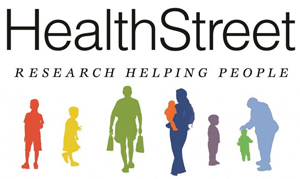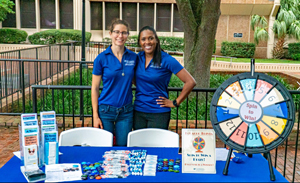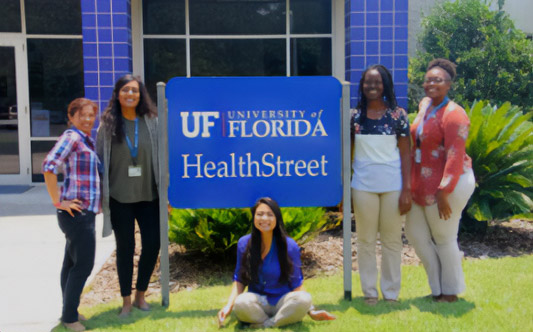HealthStreet Cognitive Screening Project
- Need: Because of the benefits associated with early identification of conditions causing memory problems, Florida's rural populations will benefit from access to screening for possible Alzheimer's Disease and other types of dementia.
- Intervention: A state university uses a state health department grant to develop a cognitive impairment screening program implemented by rural Community Health Workers. An additional grant provides rural medical practitioners with a free online continuing education module covering cognitive impairment and dementia.
- Results: To date, over 400 individuals have completed health screenings and over 900 referrals have been made to community social and medical services. At grant cycle completion, formal analysis of cognitive screening and referral to medical services will be shared.
Description
Alzheimer's Disease (AD), one of several neurodegenerative conditions that impact an individual's memory, affects 560,000 Floridians. According to the Alzheimer's Association, this number is second only behind California with a total of 670,000 with the diagnosis.
 Early
identification of problems caused by Alzheimer's and
other dementia types is important. The Alzheimer's
Association lists 4 supporting reasons for early
identification: emotional and social benefits, medical
benefits, costs savings, and more time to plan for future
impact of the condition. Experts also add that due to the
many causes of cognitive impairment, early
identification will often more specifically target the
actual cause of the problem, such as memory changes
related to normal aging or reversible memory changes
related to medications.
Early
identification of problems caused by Alzheimer's and
other dementia types is important. The Alzheimer's
Association lists 4 supporting reasons for early
identification: emotional and social benefits, medical
benefits, costs savings, and more time to plan for future
impact of the condition. Experts also add that due to the
many causes of cognitive impairment, early
identification will often more specifically target the
actual cause of the problem, such as memory changes
related to normal aging or reversible memory changes
related to medications.
With grant support from the Florida Department of Health's Ed and Ethel Moore Alzheimer's Disease Research Grant, the Department of Epidemiology at the University of Florida (UF) has designed a project that builds on UF's translational science infrastructure for community engagement. Two goals of the project are to decrease mortality-related health disparities associated with AD and to provide rural Florida providers with training specific to cognitive impairment and dementia.
The project Florida project involves specific groups within the state's rural population because research has demonstrated that some members within that population have a higher prevalence of AD and a higher death rate from the disease; yet, they are less likely to be diagnosed, provided treatment, or included in medical research.
The project setting includes one urban county, Alachua County, and eight other Florida counties chosen on the basis of their high AD mortality rates and rurality: four rural by CMS definition (Marion, Bay, Gulf, and Wakulla) and four by the Federal Office of Rural Health Policy definition (Putnam, Washington, Calhoun, and Jackson).
The department's community engagement program, called HealthStreet, uses certified Community Health Workers (CHWs) to provide health screenings to community members. The target population for this study includes those that have the highest risk of AD mortality: adults 60 years or older, and other individuals and groups in rural locations.
The CHWs engage in screening activities in various public settings such as health fairs, community centers, public libraries, clinic settings, churches, and even laundromats and bus stops in larger areas.
As a part of the health screening, the CHWs complete several forms during their intake activities: informed consent in order to collect and store personal health information; the HealthStreet Intake form, which allows CHWs to collect data on sociodemographic information, medical concerns, medical history, substance use history and willingness to participate in research; and the MoCA form, the Montreal Cognitive Assessment, an evidenced-based cognitive screening tool.
Though specific MoCA results are not shared with community members, when results indicate a community member would potentially benefit from a community resource or a visit to a medical provider, the community member or caregiver is informed verbally and receives a referral form to community resources. All community members who complete a health screening are also provided with educational materials on AD.
At 60- and 120-day intervals, CHWs follow-up with community members who complete a health screening. If a community member has expressed interest in participating in a research study, Research Navigators become part of the work flow and forward the community member's contact information to the appropriate Research Coordinator who will then contact the community member if found eligible for study inclusion.
 Primary care
clinicians in target counties are engaged in the
project's educational efforts through an email listserv
as well as through their engagement with their
professional organizations and academic institutions.
Clinicians are invited to participate in a free, online,
continuing medical education (CME) module,
From Brain Disorders to Brain Health: Prevention and
Management of Cognitive Decline and Dementia. This
CME enhances the knowledge of cognitive impairment and
dementia risk factors, screening and diagnosis,
treatment, and available resources for patients and
practitioners, including information on referring
patients to the state's
designated memory clinics. In addition, the CME
includes a pre-test and a post-test which provides data
on the improvement of knowledge among clinicians after
the completion of the CME video. Pre-test questionnaires
also track county of practice which provides a rurality
measure.
Primary care
clinicians in target counties are engaged in the
project's educational efforts through an email listserv
as well as through their engagement with their
professional organizations and academic institutions.
Clinicians are invited to participate in a free, online,
continuing medical education (CME) module,
From Brain Disorders to Brain Health: Prevention and
Management of Cognitive Decline and Dementia. This
CME enhances the knowledge of cognitive impairment and
dementia risk factors, screening and diagnosis,
treatment, and available resources for patients and
practitioners, including information on referring
patients to the state's
designated memory clinics. In addition, the CME
includes a pre-test and a post-test which provides data
on the improvement of knowledge among clinicians after
the completion of the CME video. Pre-test questionnaires
also track county of practice which provides a rurality
measure.
Services offered
Field staffing model has utilized 6 CHWs.
Tools
For screening
- Informed consent is necessary due to data collection of personal health information
- HealthStreet Intake form
- Cognitive screening tool: Montreal Cognitive Assessment
For referrals
- Community-specific resource guides created by the research team for each target county
- Paper copy of a referral form to local community social and medical services provided when screening results indicate potential benefit for a community member
Educational outreach
Community members
- Alzheimer's disease educational materials for community members and caregivers
Clinicians
- A free, online CME module for primary clinicians on cognitive impairment and dementia

Results
While the grant cycle ends February 2021, as of December 2019 results are:
- 422 completed health assessments, with a goal of
1,200 by grant's completion
- Mean age: 68 years
- 60% female
- 85% have 12 or more years of education
- 974 referrals to community medical and social services, including referrals for dental health, medical care, food and nutrition, behavioral health, support groups, Veteran's assistance, employment, classes, housing, disability services, legal assistance, animal health, education, parenting, town hall meetings, and special events
Further results will be tabulated and formally reported at the conclusion of the grant's activity.
Challenges
- Recruitment of qualified applicants to serve as CHWs in rural Florida.
- Physician-referral only requirement for patients to
receive care at state-funded memory disorder clinics
- Florida Department of Elder Affairs supports the state's Dementia Care and Cure Initiative and has 17 designated memory disorder clinics which evaluate, treat, and conduct research for patients with AD and other related dementias.
- Referrals to specialty care for rural community members (i.e. distance to medical care, transportation, etc.)
Replication
- Identification of geographic areas in most need of health assessments and cognitive screening
- Identification of collaborators with expertise in cognitive health to develop and create an educational intervention for clinicians
- Recruitment process and training protocol for CHWs
- Creation of forms for informed consent, health screening, and cognitive screening
- Identification and training of staff to create reports and complete data analyses
Contact Information
Linda B. Cottler, PhD, MPH, FACE, Associate Dean for Research and Dean's Professor, Department of Epidemiology and Director, HealthStreetUniversity of Florida, Gainesville, FL
352.294.5947
lbcottler@ufl.edu
Topics
Community health workers
· Dementia
· Elderly population
· Health disparities
· Health screening
· Human services
· Needs assessment methods and resources
States served
Florida
Date added
March 12, 2020
Suggested citation: Rural Health Information Hub, 2023 . HealthStreet Cognitive Screening Project [online]. Rural Health Information Hub. Available at: https://www.ruralhealthinfo.org/project-examples/1082 [Accessed 22 February 2026]
Please contact the models and innovations contact directly for the most complete and current information about this program. Summaries of models and innovations are provided by RHIhub for your convenience. The programs described are not endorsed by RHIhub or by the Federal Office of Rural Health Policy. Each rural community should consider whether a particular project or approach is a good match for their community’s needs and capacity. While it is sometimes possible to adapt program components to match your resources, keep in mind that changes to the program design may impact results.
